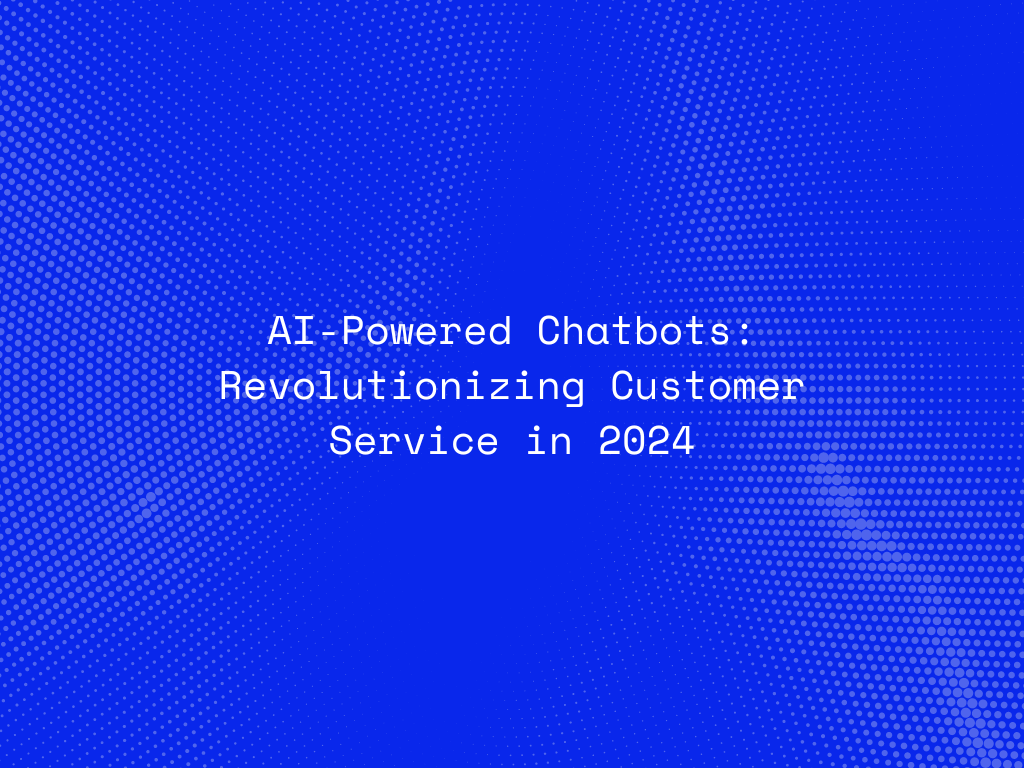In 2024, AI-powered chatbots are reshaping customer service across industries. These intelligent virtual assistants have evolved from basic scripted bots to sophisticated AI-driven systems capable of understanding natural language, providing personalized experiences, and operating around the clock. As businesses strive to meet growing customer expectations, AI chatbots have become an essential tool for delivering efficient, responsive, and cost-effective customer service.
The Evolution of AI Chatbots
AI-powered chatbots have come a long way from their early days of rule-based, scripted interactions. With advancements in natural language processing (NLP), machine learning, and conversational AI, chatbots now offer human-like interactions, making customer service more seamless and efficient.
- Natural Language Processing (NLP): Modern chatbots can understand and respond to customer queries in natural language, allowing for more intuitive and user-friendly interactions.
- Machine Learning: Continuous learning from interactions helps chatbots improve over time, providing more accurate and relevant responses.
- Multilingual Support: AI chatbots now support multiple languages, enabling businesses to cater to a global audience.
Connect With Us
How AI Chatbots Are Revolutionizing Customer Service
-
24/7 Availability
- Round-the-Clock Support: AI chatbots operate 24/7, ensuring that customers can get assistance at any time, even outside of regular business hours.
- Instant Responses: Chatbots provide instant responses to customer inquiries, reducing wait times and improving customer satisfaction.
-
Personalized Customer Experience
- Tailored Interactions: By analyzing customer data, AI chatbots can deliver personalized recommendations, offers, and support, enhancing the overall customer experience.
- Contextual Understanding: Chatbots remember previous interactions, allowing for more coherent and context-aware conversations.
-
Cost Efficiency
- Reduced Operational Costs: Automating routine customer service tasks with chatbots reduces the need for large customer support teams, lowering operational costs.
- Scalability: Chatbots can handle an unlimited number of customer interactions simultaneously, allowing businesses to scale their customer service operations without proportional increases in cost.
-
Improved Customer Satisfaction
- Consistency: Chatbots provide consistent responses, ensuring that all customers receive the same level of service, reducing errors and inconsistencies.
- Immediate Issue Resolution: For common queries and issues, chatbots can resolve problems instantly, leading to higher customer satisfaction.
-
Omnichannel Support
- Seamless Integration: AI chatbots can be integrated across various communication channels, including websites, mobile apps, social media, and messaging platforms, providing a consistent experience across all touchpoints.
- Cross-Channel Continuity: Chatbots can maintain conversation continuity across different channels, ensuring a seamless customer journey.
-
Data Collection and Insights
- Customer Behavior Analysis: Chatbots collect valuable data on customer interactions, providing insights into customer preferences, pain points, and behaviors.
- Feedback and Improvement: Businesses can use chatbot interactions to gather customer feedback, identify areas for improvement, and refine their services.
Key Technologies Driving AI Chatbots in 2024
-
Advanced NLP and Conversational AI
- Contextual AI: Chatbots can understand the context of conversations, making interactions more natural and effective.
- Emotion Detection: Some chatbots are equipped with emotion detection capabilities, allowing them to adapt their responses based on the customer’s emotional state.
-
AI-Powered Personalization
- Behavioral Analytics: AI analyzes customer behavior to deliver highly personalized experiences, from tailored product recommendations to customized support.
- Predictive Intelligence: Chatbots can predict customer needs based on past interactions and proactively offer assistance or solutions.
-
Voice-Activated Assistants
- Voice Recognition: Voice-activated chatbots enable hands-free interactions, making customer service more accessible and convenient.
- Multimodal Interactions: Combining voice, text, and visual elements, chatbots offer a richer, more interactive experience.
-
Integration with Backend Systems
- CRM and ERP Integration: Chatbots can be integrated with customer relationship management (CRM) and enterprise resource planning (ERP) systems, allowing them to access customer data, order history, and other relevant information to provide more informed assistance.
- AI Workflows: Chatbots can trigger workflows and automate processes in backend systems, further streamlining customer service operations.
Connect With Us
Use Cases of AI Chatbots in 2024
-
E-commerce
- Product Recommendations: Chatbots guide customers through their shopping journey, offering personalized product suggestions based on browsing history and preferences.
- Order Tracking: Customers can easily track their orders and get real-time updates through chatbot interactions.
-
Banking and Finance
- Account Management: Chatbots assist customers with routine banking tasks such as checking balances, transferring funds, and managing accounts.
- Financial Advice: AI-powered chatbots provide personalized financial advice based on the customer’s financial situation and goals.
-
Healthcare
- Appointment Scheduling: Patients can schedule and manage appointments through chatbots, reducing administrative workload for healthcare providers.
- Symptom Checker: Chatbots guide patients through symptom checks and provide preliminary advice, helping them decide whether to seek medical attention.
-
Travel and Hospitality
- Booking Assistance: Chatbots help customers book flights, hotels, and other travel services, providing recommendations based on preferences and past bookings.
- Customer Support: Travelers can get instant support for issues such as flight delays, cancellations, and itinerary changes.
Challenges and Considerations
-
Data Privacy and Security
- Secure Data Handling: Ensuring that customer data handled by chatbots is secure and compliant with data protection regulations is paramount.
- Transparency: Businesses must be transparent about how customer data is used and stored.
-
Human-AI Collaboration
- Seamless Handoff: Chatbots should be designed to seamlessly hand off complex queries to human agents when necessary, ensuring that customer service remains effective.
- Continuous Learning: Chatbots should be continuously updated and trained to handle new types of queries and improve their performance over time.
-
User Experience
- Natural Interactions: Chatbots must be designed to interact naturally, avoiding rigid or robotic responses that could frustrate users.
- Accessibility: Ensuring that chatbots are accessible to all users, including those with disabilities, is essential for inclusive customer service.
Connect With Us
Future Trends
-
Hyper-Personalization
- AI-Driven Insights: Chatbots will increasingly leverage AI to deliver hyper-personalized experiences, adapting to individual customer needs in real-time.
- Adaptive Learning: Future chatbots will continuously learn from each interaction, becoming more intelligent and responsive over time.
-
AI and Human Collaboration
- Enhanced Support: AI chatbots will work alongside human agents, providing support, automating routine tasks, and freeing up human agents to focus on more complex customer needs.
- AI Co-Pilots: Human agents may use AI as a “co-pilot” to assist in resolving customer issues more effectively.
-
Proactive Customer Service
- Predictive Engagement: Chatbots will proactively engage with customers based on predictive analytics, addressing potential issues before they arise.
- Automated Problem Resolution: AI chatbots will identify and resolve issues automatically, reducing the need for customer intervention.
Conclusion
AI-powered chatbots are revolutionizing customer service in 2024, offering businesses a powerful tool to meet the demands of modern consumers. By providing 24/7 support, personalized experiences, and cost-effective solutions, chatbots are transforming how businesses interact with their customers. As AI technology continues to advance, the capabilities of chatbots will only grow, making them an indispensable part of the customer service landscape. Businesses that embrace AI chatbots today will be well-positioned to deliver exceptional customer experiences and maintain a competitive edge in the years to come.




